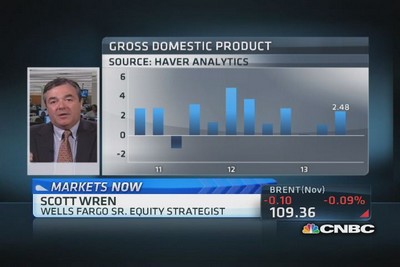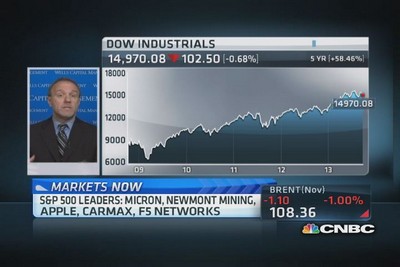US Markets Market Movers Dow 30 NASDAQ 100
By: JeeYeon Park | CNBC.com Stock Market Writer
Stocks finished broadly lower Monday,
with the Dow hitting a one-month low, as the government shutdown dragged
for a second week and as investors grew worried that lawmakers may not
be able to increase the debt ceiling, potentially leading to a default.
| Name | Price | Change | %Change | |||
|---|---|---|---|---|---|---|
| DJIA | Dow Jones Industrial Average | 14936.24 | -136.34 | -0.90% | ||
| S&P 500 | S&P 500 Index | 1676.12 | -14.38 | -0.85% | ||
| NASDAQ | Nasdaq Composite Index | 3770.38 | -37.38 | -0.98% |
The Dow Jones Industrial Average fell more than 100 points, dragged by American Express and Visa. The blue-chip index initially tumbled 150 points at the open.
The S&P 500 and the Nasdaq also closed in negative territory. The CBOE Volatility Index (VIX), widely considered the best gauge of fear in the market, spiked more than 12 percent to trade near 19, hitting a fresh three-month high.
Most key S&P sectors closed in the red, dragged by energy and financials.
"We're off session lows—people are not
going to be driven over a state of panic over this [gridlock]," said
Keith Bliss, senior vice president at Cuttone & Co. "We've seen an
orderly pullout in the market—and some sort of deal will eventually get
done."
As the government shutdown entered into a second week with no clear resolution in sight, investors remained nervous as the Oct. 17 deadline to raise the nation's borrowing limit loomed closer.
On Sunday, Treasury Secretary Jack Lew said that Congress was "playing with fire," and warned the U.S. could default in just over a week.
(Read more: So what if there's adefault? 5 things to remember)
Republican House Speaker John Boehner warned he did not have a sufficient majority to pass legislation on raising the $16.7 trillion borrowing limit without spending cut conditions attached. Speaking to ABC television over the weekend, he added that the U.S. was on the path to a credit default.
However, the chief executive of credit rating agency Moody's Investors Service ruled out the prospect of a default, even if an agreement on the debt ceiling is not reached next month.
"It is unlikely that we go past October 17 and fail to raise the debt ceiling, but even if that does happen, then we think that the U.S. Treasury is still going to pay on those Treasury securities," Moody's CEO Raymond McDaniel told CNBC.
(Read more: Wall Street gets ready to trade defaulted US debt)
"We started out with great anxiety—the weekend brought a bit more venom and vitriol...But now we haven't had any heads popping up on the TV screen and pointing at one another and making harsh claims," said Art Cashin, director of floor operations at UBS Financial Services. "And people are beginning to analyze a little bit better what the situation is—that on the 17th, we don't necessarily see the Capitol dome turn into a pumpkin."
This week, the shutdown is likely to continue to disrupt the flow of official economic data, meaning third-quarter earnings may garner extra attention as a means of gauging the state of the recovery.
On the economic front, consumer credit rose by $13.63 billion in August to $3.04 trillion, according to Federal Reserve data. Economists polled by Reuters had expected consumer credit to rise $12 billion after a previously reported $10.44 billion increase in July.
As the government shutdown entered into a second week with no clear resolution in sight, investors remained nervous as the Oct. 17 deadline to raise the nation's borrowing limit loomed closer.
On Sunday, Treasury Secretary Jack Lew said that Congress was "playing with fire," and warned the U.S. could default in just over a week.
(Read more: So what if there's adefault? 5 things to remember)
Republican House Speaker John Boehner warned he did not have a sufficient majority to pass legislation on raising the $16.7 trillion borrowing limit without spending cut conditions attached. Speaking to ABC television over the weekend, he added that the U.S. was on the path to a credit default.
However, the chief executive of credit rating agency Moody's Investors Service ruled out the prospect of a default, even if an agreement on the debt ceiling is not reached next month.
"It is unlikely that we go past October 17 and fail to raise the debt ceiling, but even if that does happen, then we think that the U.S. Treasury is still going to pay on those Treasury securities," Moody's CEO Raymond McDaniel told CNBC.
(Read more: Wall Street gets ready to trade defaulted US debt)
"We started out with great anxiety—the weekend brought a bit more venom and vitriol...But now we haven't had any heads popping up on the TV screen and pointing at one another and making harsh claims," said Art Cashin, director of floor operations at UBS Financial Services. "And people are beginning to analyze a little bit better what the situation is—that on the 17th, we don't necessarily see the Capitol dome turn into a pumpkin."
This week, the shutdown is likely to continue to disrupt the flow of official economic data, meaning third-quarter earnings may garner extra attention as a means of gauging the state of the recovery.
On the economic front, consumer credit rose by $13.63 billion in August to $3.04 trillion, according to Federal Reserve data. Economists polled by Reuters had expected consumer credit to rise $12 billion after a previously reported $10.44 billion increase in July.
Alcoa
declined after Morgan Stanley cut its rating on the aluminum producer
to "equal weight" from "overweight." The former Dow component is slated
to post earnings after the close Tuesday.
Banking giants JPMorgan Chase and Wells Fargo are slated to report Friday morning.
For the third-quarter, S&P 500 earnings are expected to increase 3.12 percent year-over-year, according to the latest data from S&P Capital IQ.
Apple ticked higher after Jefferies upgraded the tech giant's stock to "buy" from "hold." Separately, All ThingsD reports the SEC has ended an investigation into Apple's overseas cash and tax practices without taking any action.
BlackBerry jumped after Reuters reported Friday, that the troubled smartphone maker is talking to Cisco, Google and SAP about selling all or parts of the company, citing sources familiar with the matter In addition, Macquarie upgraded its rating on the company to "neutral" from "underperform."
Lockheed Martin gained after the government contractor scaled back the number of its furloughed workers. Other defense stocks including Raytheon and Northrop Grumman also edged higher.
(Read more: Debt ceiling flashback: Remember how bad 2011 was?)
Bucking the downward trend, several companies hit new 52-week highs, including Micron Tech, Southwest Air and Cardinal Health.
Banking giants JPMorgan Chase and Wells Fargo are slated to report Friday morning.
For the third-quarter, S&P 500 earnings are expected to increase 3.12 percent year-over-year, according to the latest data from S&P Capital IQ.
Apple ticked higher after Jefferies upgraded the tech giant's stock to "buy" from "hold." Separately, All ThingsD reports the SEC has ended an investigation into Apple's overseas cash and tax practices without taking any action.
BlackBerry jumped after Reuters reported Friday, that the troubled smartphone maker is talking to Cisco, Google and SAP about selling all or parts of the company, citing sources familiar with the matter In addition, Macquarie upgraded its rating on the company to "neutral" from "underperform."
Lockheed Martin gained after the government contractor scaled back the number of its furloughed workers. Other defense stocks including Raytheon and Northrop Grumman also edged higher.
(Read more: Debt ceiling flashback: Remember how bad 2011 was?)
Bucking the downward trend, several companies hit new 52-week highs, including Micron Tech, Southwest Air and Cardinal Health.
@JeeYeonParkCNBC) On Tap This Week:
TUESDAY: NFIB small biz optimism index, international trade*, Fed's Pianalto speaks, Fed's Plosser speaks, 3-yr note auction, Google announcement; Earnings from Alcoa, Yum Brands
WEDNESDAY: Mortgage applications, wholesale trade*, oil inventories, 10-yr note auction, FOMC minutes, Nike investor mtg; Earnings from Costco, Family Dollar, Chevron (interim report)
THURSDAY: Jobless claims, import/export prices*, Fed's Bullard speaks, natural gas inventories, 30-yr bond auction, Treasury budget*, Fed's Williams speaks, Fed balance sheet/money supply, chain-store sales, Draghi speech
FRIDAY: PPI*, retail sales*, consumer sentiment, business inventories*, Fed's Rosengren speaks, IMF annual mtg; Earnings from JPMorgan Chase, Wells Fargo
*Data will not be released due to the government shutdown.














0 σχόλια:
Δημοσίευση σχολίου
Ο σχολιασμός επιτρέπεται μόνο σε εγγεγραμμένους χρήστες